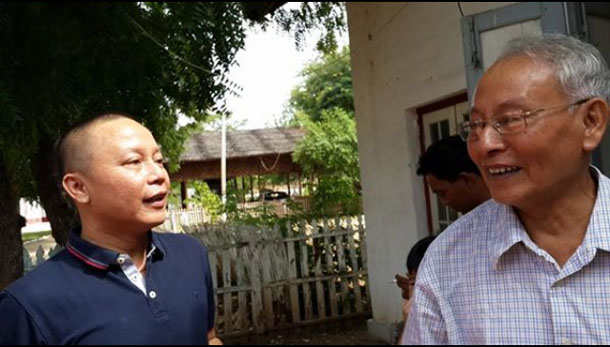Ex-Brig-Gen Thein Swe, who served as the head of international relations for Burma’s notorious Military Intelligence (MI) until he was jailed in 2004, was released from prison on October 7 as part of a presidential amnesty that freed more than 3,000 inmates. Thein Swe served nearly 42 years with the agency before being removed from his post and jailed during a purge led by then-Snr-Gen Than Shwe. The incident saw the agency’s chief, former-Gen. Khin Nyunt, and many of his top officers deposed and indicted.
Thein Swe served almost a decade of his 146-year sentence, which was handed down over 13 separate charges. He was among at least eight known members of the MI who were arrested in the purge and pardoned on Tuesday.
Upon his release, The Irrawaddy’s Thuzar spoke with Thein Swe about his years in prison and his political views.
Question: How do you feel being released from prison?
Answer: I have spent almost a decade in prison. The 19th of this month would have marked 10 years. I am grateful to the president and concerned persons for this amnesty, and I hope that my ex-colleagues who remain behind bars will be released as soon as possible. I feel sorry that some are still in jail while others have been released. They are all getting on in age; therefore I hope that they will be released very soon. I think the president will free them sometime in the future.
Q: You were originally sentenced to 146 years in jail. What were the charges?
A: I was tried and sentenced under a total of 13 charges, including deception and possession of an unlicensed firearm.
Q: How many of your colleagues from Military Intelligence were also jailed during the purge and remain behind bars?
A: As far as I know, there were 18 people jailed. Authorities said that eight were released [on Tuesday]. So I think there are around 10 people still behind bars. I’m not sure, but I am the only ex-Military Intelligence personnel released from Myingyan Prison [as part of the Oct. 7 amnesty].
Q: What was prison life like? How did you pass the time?
A: Since I am in my old age, I mostly read books on Buddha’s teachings and I meditated—something that I had not done when I was free. I read all kinds of things in prison. I remember that Zaw Thet Htway wrote a story about me in Tomorrow Journal. He wrote that I was put in ward-5 of Insein Prison where I met U Kyaw Hsan from the National League for Democracy (NLD), and that I confessed to him that we [MI] did wrong and I apologized. That story was wrong. I was sent directly to Myingyan Prison and I did not meet anyone named U Kyaw Hsan.
Q: What do you think of Burma’s current political landscape?
A: Regarding political change, I’d say the government is doing as much as they possibly can. Every government is burdened by the actions of their predecessors. No government can make everything better overnight. Therefore, I’d like to call for patience and collaboration. Nothing can be achieved by pointing fingers at each other.
Q: What do you think about reports that fighting continues between the Burmese military and ethnic armed groups, even as they try to negotiate a nationwide ceasefire agreement? Do you think, as some say, that the peace process is a political ploy?
A: Everyone has their own view. I have no comment about this, because every troop has its own rules to follow. You can’t throw flowers at someone who is shooting at you. This is the one rule that every troop must follow. You won’t survive if you do not shoot back. This is the rule. Both sides think they are in the right. It’s really difficult to say.
Q: Do you plan to enter politics now that you are a free man?
A: I am not interested in going into politics at all and I see no reason to do so. I am now over 70 years old, and I’m afraid I won’t have more than about 15 years of healthy, active life.
Besides,I have undertaken serious study of the Dhamma [Buddha’s teachings] while in prison, and I realized that only Dhamma can ease worries and bring peace of mind. I take it that I was imprisoned because I committed misdeeds in a previous existence, so I find no reason to take revenge against anyone.
Q: When he was released, Khin Nyunt said that his subordinates were punished because of him and that he would urge the government to release them quickly. Do you think that he played a part in your release?
A: I have no idea. I wasn’t aware that I would be released until this morning [Oct. 7]. I have no idea how the decision was made to release us.
Q: Some ex-intelligence officers have expressed regret that the MI is often viewed as a blemish on Burma’s history and politics. Could you comment on the agency’s reputation?
A: I have no comment about this, everyone has their own opinion. It is true that some [former MI officers] feel sorry that they are viewed as bad guys. From a religious point of view, we have to pay back for the wrong we did in previous lives. While we have done our best for our country, we have to suffer for what we did wrong in past incarnations. Let bygones be bygones. There is no need to have particular feelings about this now.
Q: Have you ever regretted serving as a section head in Burma’s Military Intelligence?
A: History will decide [whether I am good or bad]. I have no comment.

















